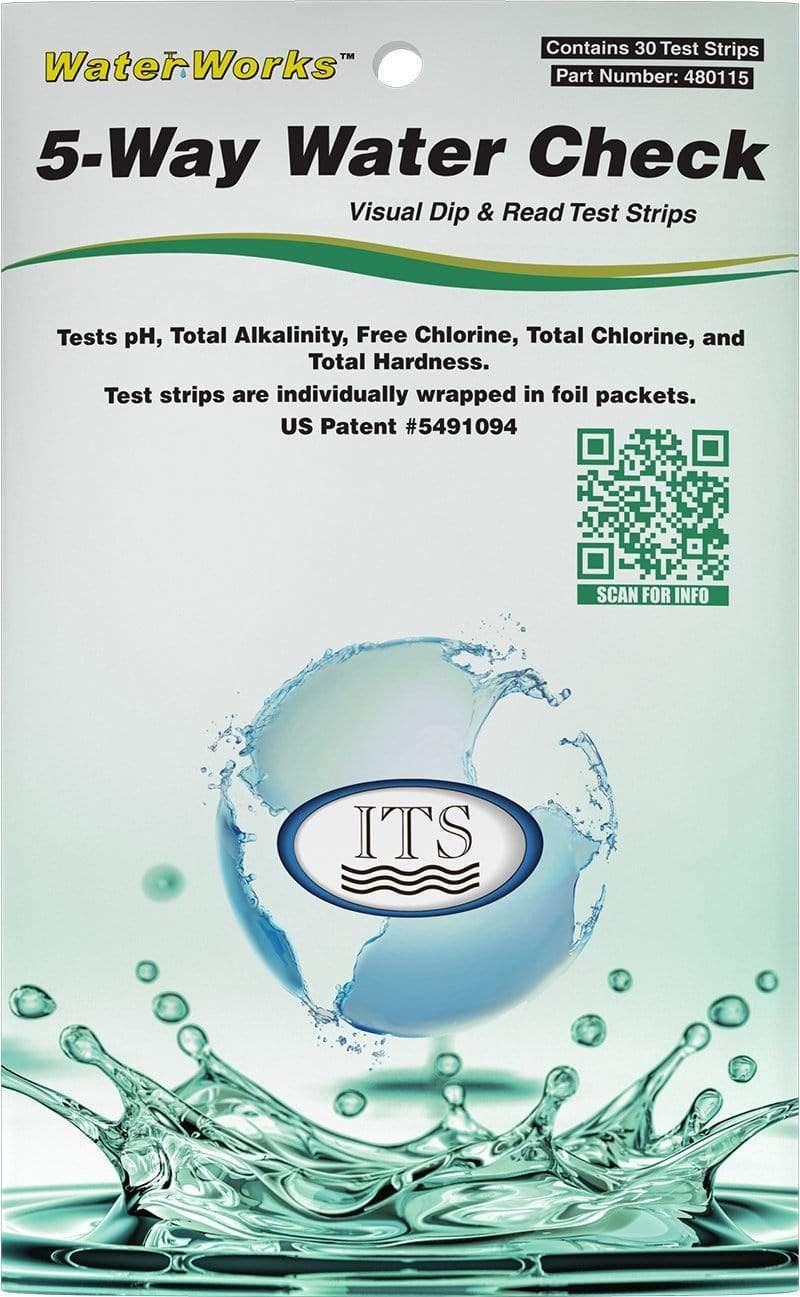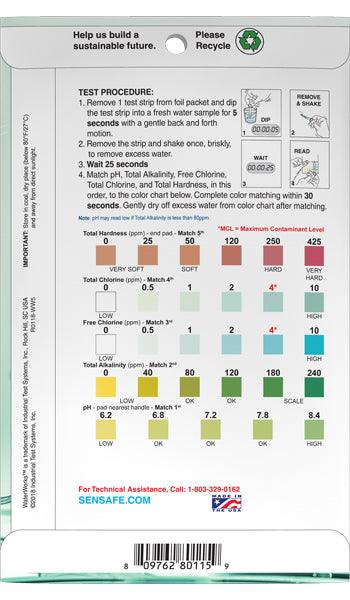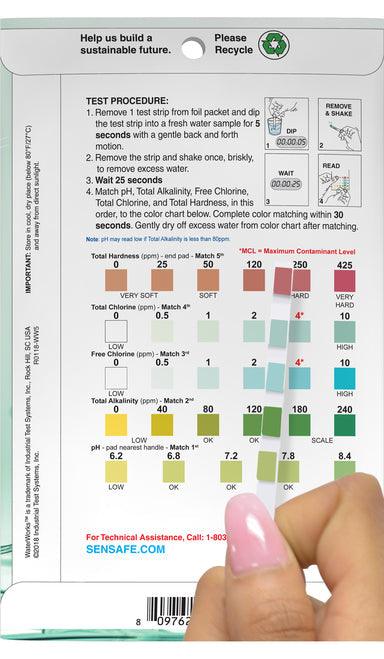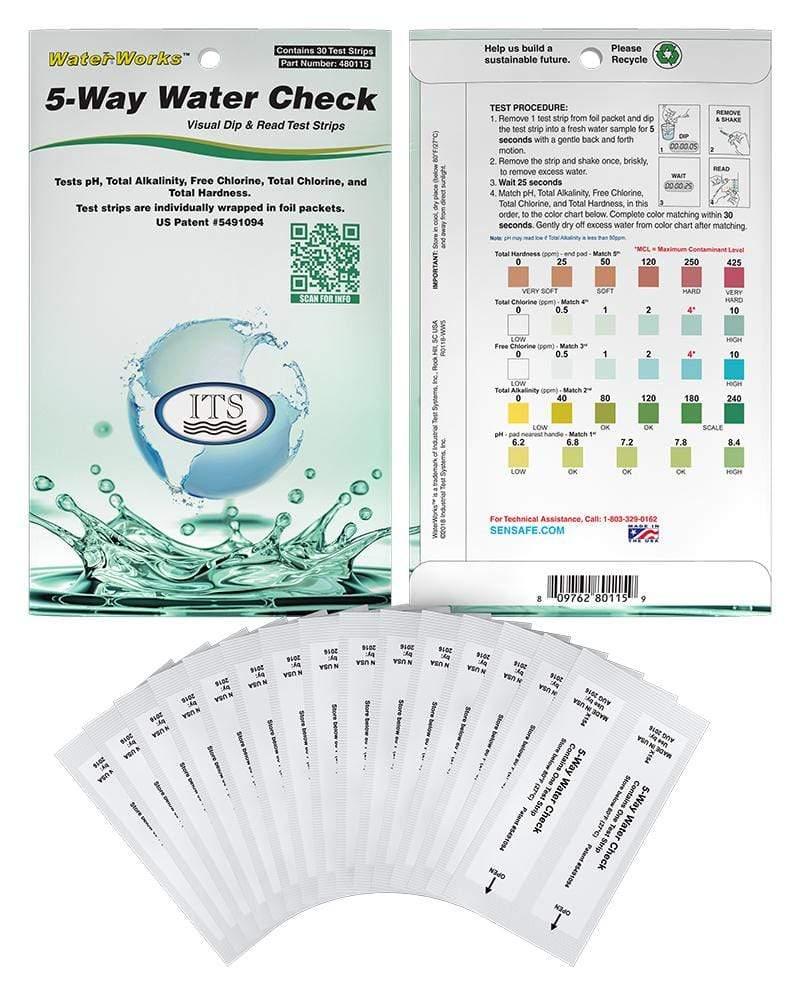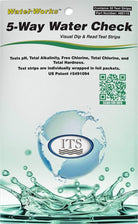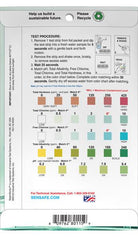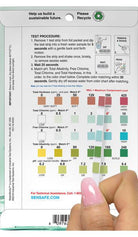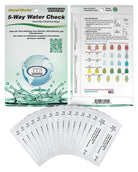WaterWorks™ 5-Way Water Check Eco Packs (NCW-480115)
Description
It is a simple dip and read test strip with a precise colour chart on the back of the bottle and the results are shown within 30 seconds.
This broad use strip can test for these parameters in water across industries including swimming pools and spas. No other reagents or accessories are needed for this test. We use trace amounts of chemicals on our strips which makes them extremely safe and non-hazardous. They are considered as Articles under OSHA and do not require SDS sheets. This packaging is recyclable.
Why test for Total Hardness? Water flowing through the ground is naturally filtered of small particles, but some minerals naturally occurring in the ground may dissolve into groundwater. (Stalactite and stalagmite formation in caves occurs when groundwater redeposits these minerals). Hard water (above 120ppm, originally called “hard” because it was hard to form suds with soap) contains high levels of dissolved minerals, particularly calcium and magnesium.
Hard water, above 250ppm total hardness, tends to form scale inside pipes and in the sink and tub. Soft Water (below 80ppm) contains very few dissolved minerals and forms suds with soap easily. When the TH of water drops below 40ppm, particularly when alkalinity and pH are low, it becomes corrosive and may damage plumbing made from copper or iron and may damage lead solder used in copper plumbing joints.
Why test for Free and Total Chlorine? Chlorination of water supplies serves to destroy and deactivate disease producing microorganisms. It is particularly useful in treating drinking water resulting in an overall improvement of the water quality. Chlorination also may introduce undesirable taste and odor characteristics. To monitor chlorination, and to minimize any adverse effects, it is essential that proper testing is performed routinely.
Free Chlorine is a very effective disinfectant. Total chlorine is the combination of both free (available) chlorine and reacted chlorine, or chloramines. Chloramines are formed when free chlorine reacts with organic compounds. Chloramines are less effective at disinfection than free chlorine and may cause eye and skin irritation in addition to a strong chlorine smell.
The ideal Total Chlorine levels for drinking water are 0.2 - 0.5 ppm. If you use city water and your Total Chlorine level reads 0, then you should call your local water treatment center. Chloramine levels can be determined by subtracting the amount of free chlorine from the amount of total chlorine.
Why test for Total Alkalinity? Not to be confused with “Alkaline,” Total Alkalinity (TA) is a measure of the capacity of water to resist change in pH. Measured as ppm Calcium Carbonate (CaCO3), TA is a sum of the buffering materials that neutralize acids - primarily hydroxide, carbonate, and bicarbonate ions. The pH of water which has low TA can change quickly, and with little resistance. Water with a good level of TA resists rapid changes in pH and is more stable. High TA can cause the water to have a high pH, become cloudy, and cause scaling. Water with a low TA level can quickly and easily change the pH of the water.
Why test for pH? Technically speaking, pH is a measure of the concentration of hydrogen ions (H+) in water. Simply put, it is a measure on a scale of 0 to 14, water with a pH of 7 is considered neutral while water greater than 7 is alkaline, or basic, and water less than 7 is acidic. Ideal pH levels for drinking water are 6.5 - 8.5. When the pH of water drops below 6.5, particularly when alkalinity and hardness are low, it becomes corrosive to metal plumbing. As a result, metal plumbing can wear prematurely and the water could contain metals such as Lead, Copper, Iron, etc. Water pH levels above 8.5 tend to leave deposits on fixtures and sanitizers such as chlorine become less effective.
Detects
Test Quantity
Parameters
Couldn't load pickup availability

